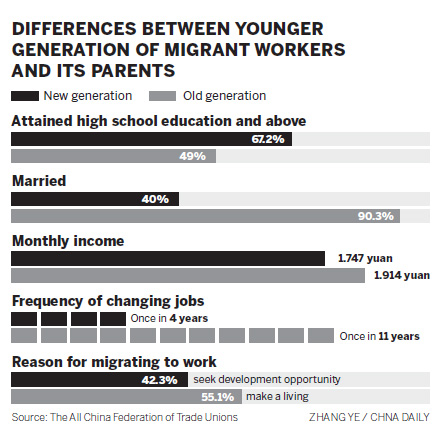Survey: Migrants have it tough
A large number of the younger generation of migrant workers is exposed to unsafe conditions during work and receives little protection from such dangers, according to a survey released on Sunday by the country's top trade-union organization.
 |
|
Survey: Migrants have it tough |
The report defines the younger generation of migrant workers as comprising people who were born in rural areas after the 1980s and are older than 16.
There are almost 100 million of them across the country. Generally, they are better educated than their parents, many of whom set out to make a living after finishing middle school.
The All China Federation of Trade Unions' survey found that nearly 74 percent of the younger generation of migrant workers are employed by manufacturing industries and only 84.5 percent of them have signed labor contracts with employers.
Furthermore, 36.5 percent of the group work under unbearably high or low temperatures, 41.3 percent of them in very noisy environment, 36 percent in conditions where a mechanical failure will easily lead to injuries, and 34.7 percent in dust-polluted workplaces.
The report said they are scarcely protected from such dangers and rarely receive training in the use of proper work procedures or examinations to check for occupational ailments.
In the latest case shedding light on the dangerous conditions in which many migrant workers make a living, Apple Inc admitted last week that 137 workers at the Suzhou facility of Wintek, one of the company's touch screen suppliers, had suffered adverse health effects following their exposure to n-hexane, a chemical found in the cleaning agents needed for some manufacturing processes.
And the trade union's report revealed that few young migrant workers, when compared with the rest of the population, enjoy social security benefits.
Only 67.7 percent of them are covered by endowment insurance, 77.4 percent by medical insurance and 70.3 percent by worker's compensation insurance. The rates, respectively, are 23 percent, 14 percent and 9 percent lower than those of urban workers, it said.
Lu Xuejing, a labor expert at the Beijing-based Capital University of Economics and Business, said the Apple case caught the attention of employers in labor-intensive industries, some of whom are waking up to the importance of providing safe and sanitary workplaces.
"If employers do not strictly adhere to the laws mandating safe working standards, they will be unable to attract workers and it is they who will finally suffer the greatest losses," she said.
Labor departments should also become stricter in their inspections of factories, punish violators and oversee mandated remediations to ensure that work conditions indeed improve, Lu suggested.
Trade unions within companies should also make sure that workers are aware of their right to a safe workplace, better enabling them to protect their own interests, she said.
Speaking of the low number of migrant workers who enjoy some form of social insurance, Lu said social security policies should be strengthened, especially when they pertain to private firms or firms financed by foreigners, which employ the majority of migrant workers.
 0
0 







Go to Forum >>0 Comments